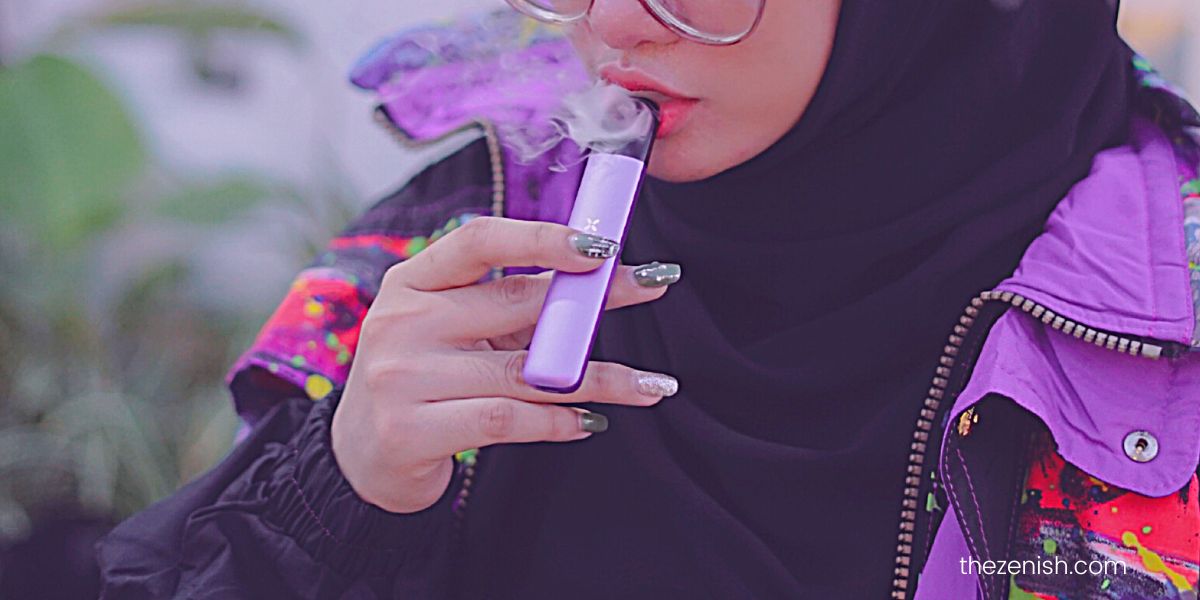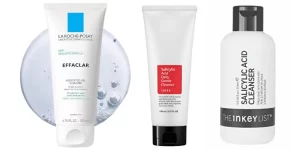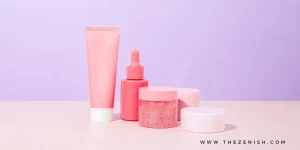
If you’re a regular Juuler and have been experiencing acne breakouts or other skin conditions, you may be wondering if there’s a connection between the two.
Juuling is increasingly popular, especially among teenagers and young adults, but could it be causing acne? Does juuling cause acne and other skin problems?
While there’s no direct evidence linking Juuling to acne, there are several potential mechanisms by which e-cigarettes or vape pens could contribute to acne breakouts.

For example, electronic cigarettes contain nicotine, which can increase cortisol production and disrupt circadian processes, both of which have been linked to acne.
Additionally, the chemicals in e-cigarette vapour can irritate the skin and clog pores, leading to the development of acne.
To date, the research on the relationship between Juuling and acne is still in its early stages, and more studies are needed to fully understand the potential risks.
However, if you’re experiencing acne breakouts and are a regular Juuler, it may be worth cutting back or quitting altogether to see if your skin improves.
But what is Juuling?
If you’re not familiar with Juuling, it’s a form of vaping that’s gained popularity in recent years. Juul is a brand of e-cigarette that is sleek and discreet, making it easy to hide and use in public.
Unlike traditional regular cigarettes, Juuls don’t produce cigarette smoke.
See also: Does smoking cause acne?
Instead, they heat up a liquid (called e-juice) that contains nicotine and other chemicals, turning it into an aerosol that is then inhaled.
One of the reasons Juuls have become so popular is because they come in a variety of flavors, making them more appealing to teenagers.
However, the chemicals used to create these flavors can be harmful to your health and have numerous health risks.
Juuls and other e-cigarettes are not safe or healthier alternatives to traditional cigarettes.
Even though they may be less harmful in some ways, they still contain nicotine and other chemicals that can have negative effects on your health.
What causes acne?
Acne is caused by a clogged pore. Now there are a few things that can indirectly and directly contribute to clogged pores in your skin over time. Here are a few things that will contribute to and cause acne:
Skincare products
We all want to use products that will help us achieve our best skin. But, sometimes the products we use actually contribute to and cause acne instead.
Here are some ways that your skincare products can cause acne:
- Clogging pores: Some skincare products can contain pore-clogging ingredients like oils which can cause acne.
- Over-drying: Overly-drying products can strip your skin of its natural oils (disrupting your natural skin barrier), causing it to produce more oil in response. This excess oil can clog your pores and cause acne breakouts.
- Overuse of acne-fighting products: While acne-fighting products can be helpful, using too much or too frequently can irritate your skin and actually make your acne worse.
- Dirty brushes or sponges: Using dirty makeup brushes or sponges can introduce bacteria to your skin, which can also cause acne.
So, what can you do to avoid skincare products causing acne? Here are a few tips:
- Read the ingredients: Look for non-comedogenic products that won’t clog your pores.
- Don’t overdo it: Use only the recommended amount of product, and don’t overuse acne-fighting products.
- Keep it clean: wash your brushes and sponges regularly.
- Pay attention: after introducing a new product into your routine, if you start noticing new breakouts on your skin in areas where you don’t usually get blemishes breaking out after starting a new skincare product, discontinue use and speak to a dermatologist.
While some skincare products can cause skin irritation and acne, there are plenty of options out there that won’t.
Hormonal Changes
Hormonal changes are another common cause of acne, especially among teenagers and young adults. During puberty, your body goes through many changes, including an increase in hormone production.
These hormones can cause an increase in oil production, leading to clogged pores and acne outbreaks.
But hormonal changes can occur at any age, not just during puberty. Women, in particular, may experience hormonal changes during their menstrual cycle, pregnancy, and menopause, which can also lead to acne breakouts.
While hormonal changes are a natural part of life, there are things you can do to help prevent acne caused by hormonal changes:
- Maintain good skin hygiene: Regularly washing your face with a gentle cleanser can help to remove excess oil and dirt and dead skin cells that can clog pores.
- Use non-comedogenic products: Look for products that are labeled “non-comedogenic,” meaning they won’t clog your pores and agree safe for acne-prone skin.
- Manage stress: Stress can cause hormonal changes, which can contribute to the formation of acne. Dealing with stress through things like exercise, meditation or therapy can help.
- Talk to a doctor: If you’re experiencing persistent acne due to hormonal changes, talk to a doctor about treatment options. There are medications and topical treatments that can help to regulate hormone levels and reduce acne breakouts.
Diet
Did you know that your diet can also play an indirect role in the formation of acne? Eating certain foods can increase skin inflammation, oil production, and clogged pores, which can cause breakouts.
Here are some foods that may contribute to acne:
- Dairy: Studies have shown that consuming dairy products, such as milk and cheese, can increase the risk of acne. This is thought to be due to the hormones and growth factors found in dairy products.
- High-glycemic-index foods: Foods that are high in sugar and carbohydrates, such as white bread and candy, can cause a rapid increase in blood sugar levels, leading to increased inflammation and oil production in the skin.
- Fried and greasy foods: Foods that are high in saturated and trans fats, such as fast food and fried foods, can also contribute to the formation of acne.
While there’s no one-size-fits-all solution when it comes to diet and acne, there are some general guidelines that can help:
- Eat a balanced diet: Incorporate plenty of fruits, vegetables, whole grains, and lean proteins into your diet to provide your skin with the nutrients it needs to stay healthy.
- Limit dairy and high-glycemic-index foods: If you’re experiencing acne breakouts, consider limiting your intake of dairy and high-glycemic-index foods to see if it makes a difference.
- Drink plenty of water: Staying hydrated can help to flush out toxins from your body, which can contribute to the formation of acne.
Remember, while diet may play a role in the formation of acne, it’s just one factor among many. By taking care of your skin and making healthy choices, you can help to prevent and manage acne breakouts.
Stress
Stress is something that we all experience from time to time, but did you know that it can also contribute to acne?
When you’re stressed, your body produces hormones like cortisol and adrenaline, which can cause an increase in oil production in the skin.
Here are some ways that stress can contribute to acne:
- Increased oil production: When you’re stressed, your body produces more oil, which can clog your pores and lead to the formation of acne.
- Inflammation: Stress can also cause inflammation in the body, which can exacerbate acne breakouts.
- Poor sleep: Stress can make it difficult to get a good night’s sleep, which can in turn lead to the formation of acne.
While it’s impossible to completely eliminate stress from our lives, there are things you can do to help manage it:
- Exercise: Regular exercise can help to reduce stress levels and improve overall mood.
- Practice relaxation techniques: Techniques like deep breathing, meditation, and yoga can help to reduce stress and promote relaxation.
- Get enough sleep: Aim for 7-9 hours of sleep each night to help your body manage stress and stay healthy.
Bacteria
Believe it or not, there are billions of bacteria living on your skin at any given time. While most of these bacteria are harmless, some can contribute to the cause of acne.
Here’s how bacteria can contribute to acne:
- Clogged pores: Bacteria can contribute to the formation of acne by clogging pores and leading to the formation of whiteheads and blackheads.
- Inflammation: When bacteria invade clogged pores, they can trigger an immune response that leads to inflammation and the formation of red, swollen pimples.
- Spread of infection: Bacteria can also spread from one pore to another, leading to the formation of multiple acne lesions.
While it’s impossible to completely eliminate bacteria from our skin, there are things you can do to help manage it:
- Wash your face regularly: Use a gentle cleanser to wash your face twice a day to help remove excess oil and bacteria.
- Don’t touch your face: Touching your face can transfer bacteria from your hands to your skin, leading to the formation of acne.
- Avoid sharing personal items: Sharing items like towels and makeup brushes can also transfer bacteria and contribute to the formation of acne.
Does juuling cause acne?
Juul pods contain a plethora of chemicals that could potentially harm your skin. Some of these chemicals can clog pores, leading to breakouts and acne.
Nicotine, the main ingredient in Juul pods, is known to have adverse effects on the skin. It reduces blood flow to the skin, making it more prone to acne and other skin issues.
Plus, Juuling can dehydrate your body, leading to dry, flaky skin that’s more susceptible to acne.
So, it’s safe to say that Juuling and acne have some sort of correlation.
Chemicals in Juul pods that can cause acne
The specific chemicals in Juul pods that can cause acne include propylene glycol, glycerol, and benzoic acid. These chemicals can clog pores and irritate your skin, resulting in the formation of pimples, blackheads, and whiteheads.
The flavourings used in Juul pods could also be harmful to your skin. Some flavourings, such as cinnamon, have been known to cause allergic reactions and irritation on the skin.
So, if you’re prone to acne, it’s best to steer clear of flavoured Juul pods.
One study found that the chemicals found in e-cigarettes, including Juul pods, can damage collagen and elastin fibers in the skin, leading to premature aging and wrinkles.
This study highlights the negative impact that Juuling can have on overall skin health.
Nicotine’s effect on acne
As mentioned earlier, nicotine can reduce blood flow to the skin, leading to a lack of oxygen and nutrients that are necessary for healthy skin. This can result in the formation of acne, wrinkles, and premature aging.
Moreover, nicotine is a vasoconstrictor, which means it narrows blood vessels, leading to a decrease in the amount of water and nutrients that reach the skin.
This can cause dehydration, which is a major factor in the formation of acne.
So, it’s essential to stay hydrated if you’re a Juul user. Make sure to drink plenty of water throughout the day to keep your skin healthy and glowing.
And, if you’re experiencing acne breakouts, it’s best to cut back on your Juuling habit and give your skin some time to heal.
One study also found that nicotine can stimulate the production of sebum, which is the oil that your skin naturally produces.
When sebum production is increased, it can clog pores and lead to acne. Another study found that smokers were more likely to experience acne than non-smokers, which suggests that nicotine does play a role in the formation of acne.
So, if you’re a Juul user, be mindful of the effects of nicotine on your skin. Limiting your Juuling habit can help to reduce the risk of developing acne and other skin issues.
Additional tips for preventing acne
#1 Drink water and moisturize
Drinking water is a simple yet effective way to not only keep your body healthy but to keep your skin healthy and prevent acne. When you’re dehydrated, your skin can become dry and flaky over time, leading to irritation and breakouts.
Drinking water helps to hydrate your body from the inside out, providing it with the moisture it needs to stay healthy and glowing.
See also: Does drinking water help acne?
Using hydrating moisturizer paired with a hyaluronic acid serum will help moisturize your skin on the outside and help prevent trans epidermal water loss.
Water also helps to flush out toxins from your body, which can contribute to the formation of acne.
So, how much water should you be drinking?
The general rule of thumb is to aim for at least eight glasses of water per day. But this varies depending on your lifestyle and other aspects.
If you’re finding it difficult to drink enough water throughout the day, try carrying a water bottle with you or setting reminders on your phone to drink water.
You can also try adding some flavor to your water by infusing it with fruit or herbs to make it more enjoyable to drink.
#2 Avoid Juuling
If you’re concerned that Juuling is causing your acne, one of the best things you can do is to avoid Juuling altogether.
Quitting Juul may seem challenging, but it’s a crucial step towards better overall health and skin.
Here are some tips to help you quit Juuling:
- Set a quit date: Choose a date to quit Juuling and stick to it. Having a set date can help you stay focused and motivated.
- Find support: Quitting Juuling can be challenging, but you don’t have to do it alone. Don’t hesitate to talk to your loved ones if you need help. You may also consider joining a support group – it can be really helpful.
- Identify triggers: Identify the situations or emotions that trigger your Juuling habit and try to avoid them or find healthier ways to cope.
- Seek professional help: If you’re struggling to quit Juuling on your own, consider seeking professional help from a doctor or therapist.
Remember, quitting Juuling is not just about preventing acne; it’s about improving your overall health and well-being.
By quitting Juul, you can reduce your risk of developing other health issues like lung cancer and enjoy clearer, healthier skin.



